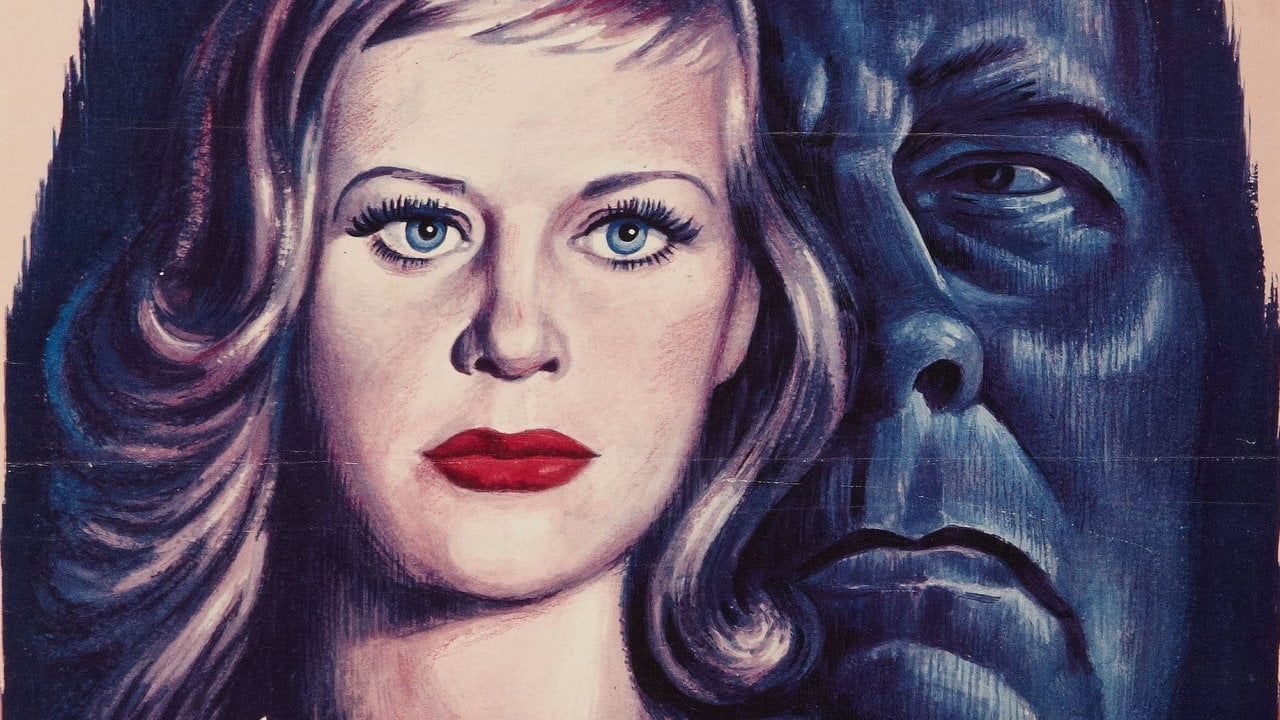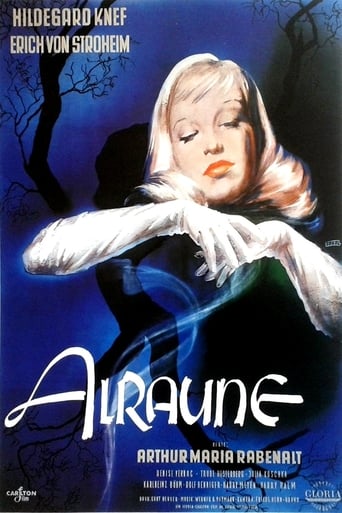Laikals
The greatest movie ever made..!
Infamousta
brilliant actors, brilliant editing
CommentsXp
Best movie ever!
Gurlyndrobb
While it doesn't offer any answers, it both thrills and makes you think.
Richard Chatten
The fifth and - to date - last film version of Hanns Heinz Ewers' 1911 bestseller is handsomely mounted, interestingly cast and far too talky. It worked far better as a silent film, with Brigitte Helm much more convincing than dear Hildegard Knef as the soulless product of artificial insemination. By bestowing such inauspicious parenthood upon his creation Professor ten Brinken (Erich von Stroheim!) explicitly states that it's his desire that a bit of depravity in her genes will create a more exotic bloom than two upstanding citizens could have produced; although real life is constantly demonstrating that Mother Nature can be depended upon to regularly create plenty of young women with more conventional antecedents capable of wreaking just as much havoc among the male sex.Although Ewers was initially an enthusiastic supporter of the New Order and joined the NSDAP in 1931 - and 'Alraune' clearly reflected the eugenics debate that Hitler brought into disrepute - it wasn't filmed during the Nazi era. The director of this postwar version, Arthur Maria Rabenalt, had been an enthusiastic propagandist for the Nazi regime, which makes him an ironic choice for such potentially touchy subject matter.
karinrjeffrey
The title refers to the German word for Mandrake root. A disturbing and noir-like horror movie that viewers will either love or hate, it has a queasy quality with elements of camp that will either annoy or delight.Charismatic actor and director Erich von Stroheim, who held his own in Sunset Boulevard, doesn't disappoint here. Karl Boehm, the wide-eyed, eerily handsome actor who rose to stardom in the British cult horror classic Peeping Tom, is also very watchable.Context is everything. This is an intriguing horror film that will reward a second viewing.
keith-moyes-656-481491
I have finally managed to catch up with this hard-to-find movie on a budget DVD.Even in 1952, when the movie was first made, it was already an anachronism, full of the misogyny that seemed to characterise German movies from the early Twentieth Century (e.g. The Blue Angel). Typically they featured a beautiful woman who exerts a fatal attraction on all the men around her and then humiliates and destroys them.The femme fatale in this movie is Alraune. She is the result of the artificial insemination of a prostitute by a murderer. This 'unnatural union of tainted blood' is posited as the reason for her selfishness, emotional frigidity and destructiveness. However, at the very end, the movie suddenly flips and holds out the possibility that her soulless predation on men is due to nurture rather than nature. I doubt if this is thematic sophistication on behalf of the film-makers. Probably, it is just indecisiveness.I find this film hard to evaluate, because the print is very poor and there are some baffling artifacts in the DVD transfer that I have never encountered before. More to the point, the movie is only 79 minutes long, as against the 92 minutes quoted on IMDb. I do not know whether this trimming was undertaken when the English language version was prepared, or whether it is a consequence of damage to the print itself. Possibly it is both.This might explain the strange editing. There are some very abrupt plot transitions that suggest significant cuts were made for US distribution but, in addition, the transitions between the remaining scenes are sometimes so sharp that the dubbed dialogue seems to spill over from one scene to the next. This gives the film a disconcerting rhythm. The pacing within scenes is often quite ponderous (I am tempted to say 'Germanic'), but the cutting between them is very sharp. The result is that the movie seems both leaden and breathless at the same time. I would be interested to see the original German language version to see if it has this same paradoxical feel.It is difficult for me to recommend this movie in the form in which I have seen it. It really needs to be viewed in a reasonably good, and reasonably complete, print.Despite all its deficiencies, I found that Alraune did exert a weird sort of fascination, but I recognise that it will probably only appeal to those people who are particularly curious about the oddities that can occasionally be disinterred from the remoter hinterlands of the movie landscape.To the more general movie-goer I would say: "there are better things to do with your time."
John Seal
This fascinating German fantasy film stars the legendary Erich von Stroheim as Professor Jacob ten Brinken, a brilliant scientist who has played God and created the world's first test tube baby. Now fully grown, Alraune (Hildegard Knef) is a beautiful but affectless creature whose way with the opposite sex threatens to ensnare the Professor's nephew (a very young looking Carlheinz Bohm). Alraune's amorality--presumably the result of being bred from the egg of a prostitute and the sperm of a murderer--has not been tempered by a spell in convent and now threatens to destroy the family legacy. Though clearly set before World War II, the film reflects concerns about the misuses of science by the Nazi regime, though perhaps the conclusions it reaches are not that far afield from those of Dr. Mengele. Alraune is a missing link between German expressionism and the Italian Gothic cinema of the early 1960s, with a dash of Jean Cocteau thrown in for good measure. Interesting sidenote: it sure sounds like von Stroheim dubbed his own English language track.

